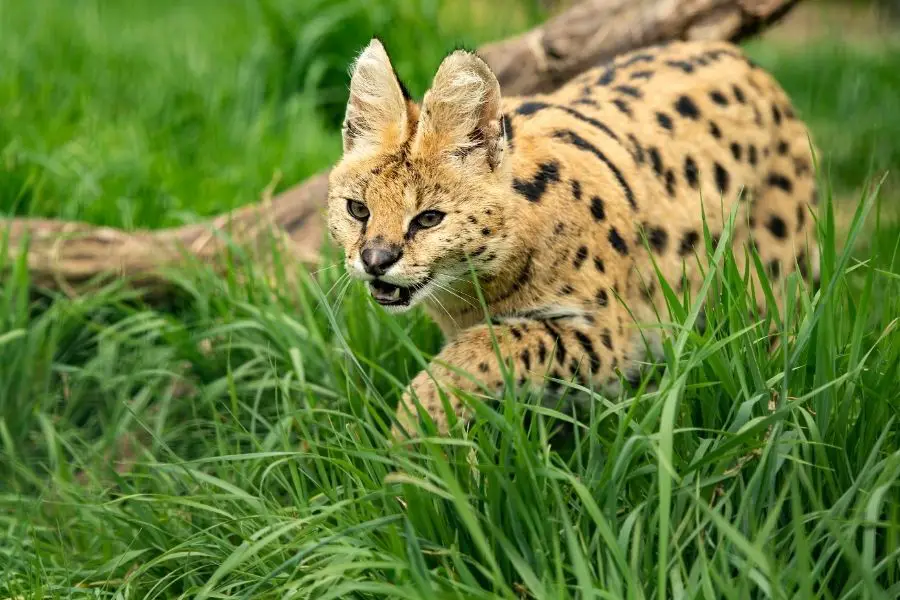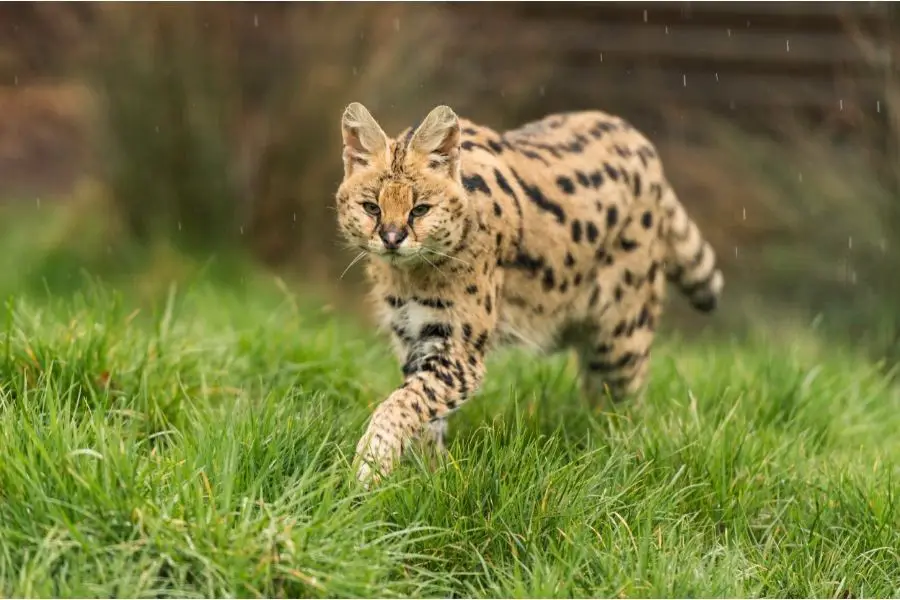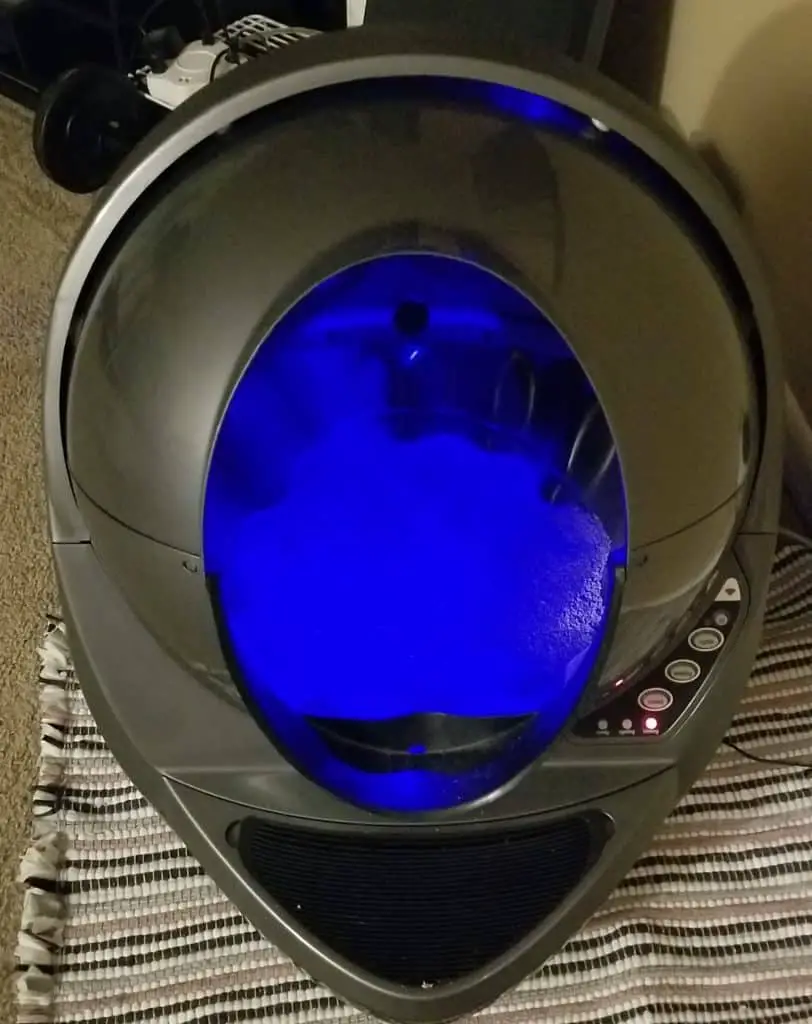More Meows is an Amazon Associate. As an Amazon Associate we earn from qualifying purchases. We may also earn commissions if you purchase products from other retailers after clicking on a link from our site.
The serval cat is a wild cat native to the lush savannahs of Africa. They are similar in size to a house cat, distinguished by long pointy ears, and have fur coats resembling leopards or cheetahs. If you are interested in the typical behavior of serval cats or are even considering owning one, you might be wondering, are serval cats dangerous?
Yes, Serval cats are regarded as wild and dangerous animals. This is because they are not as large as other wild cats such as lions, tigers, or cheetahs. However, the speed, strength, and precision hunting skills of a serval cat can threaten humans and other animals.
The following paragraphs will outline and explain the reasons why a serval cat would be considered dangerous. Other questions about serval behavior and how poorly they serve as house pets will be discussed. To learn more about serval cats, read on!
If you wonder what the best products are for your cat, check out this article that will break down all my recommendations for you: Things To Buy For A Cat Right Now!
Are Serval Cats Dangerous to Humans?
Serval cats that are kept as exotic pets have even been known to display affection toward their owners. But can they pose a danger to those same owners under the right (or perhaps I should say the wrong) circumstances?
Serval cats don’t usually pose a direct threat to humans. They’re smaller than most exotic cats and do not have large claws or teeth that could be used to attack or harm a human. However, the wild instincts and physical abilities of a serval cat can pose a threat to humans and other animals.
Serval cats are incredibly strong and fast. Furthermore, they can jump between 2 – 3.6 meters, have a top speed of 50 mph (80 km/h), and can stun a fish or bird with one powerful swat of their paw.
The pure strength of a serval can lead to severe, even deadly, wounds. For example, according to the Department of Agriculture and Fisheries report in Queensland, “Servals have a bite force at the canine teeth of 172 Newtons, whereas feral domestic cats have a bite force of 56 Newtons.”
In attempting to capture and kill its prey, a serval cat has a success rate of 90%. This is exceptionally high. For context, the kill rate of a domestic house cat and even a tiger is only about 10%. Because of their precision and accuracy, serval cats are recognized as the best hunters out of all exotic cats.
The serval cat has several physical traits that make them dangerous animals. Their long, pointy ears make the serval a superior wild cat. They often sit and listen for their prey burrowing underground or even underwater. The serval’s long and sharp claws also make them effective hunters. Without being declawed, a serval cat scratch is deep and often fatal to its catch.
| Reasons Serval Cats Are Dangerous | Description |
| Bite Strength | Bite force of 172 Newtons which is much more than domestic cats |
| Hunting Accuracy | 90% success rate while hunting |
| Excellent Hearing | Their ears are phenomenal at hearing prey |
Combining their physical attributes and their instinct to hunt with high accuracy, a serval cat could very quickly hurt a human.
Are Serval Cats Aggressive?

Serval cats are not particularly aggressive animals. However, though their behavior is not always hostile or combative, servals are extremely territorial and engage in rough play.
Servals are well-known for excessively urinating on areas that they perceive as their territory. When they feel their territory is being encroached on by other humans or animals, they may attack by clawing, lunging, or pouncing.
When in their natural habitat, servals usually avoid individuals and do not often fight with one another. Aggression between servals is displayed in more ceremonial behaviors, such as facing one another or placing a paw on another’s chest.
Servals sometimes display aggressive behavior in the way they play. For example, they can bite, claw, and even hiss when engaging in foreplay with humans. This behavior may not be intentionally hostile but can make it dangerous and difficult to interact with them.
Do Serval Cats Make Good Pets?
While servals are sometimes kept in captivity or as exotic pets, they are wild animals that are exceptionally difficult to care for, which makes them terrible pets.
Serval Cats do not make good pets. They are animals that require extensive care outside of their habitats and are not meant to live in homes alongside humans. You may also have challenges keeping Servals with other domestic animals.
The main reasons you should not keep a serval as a house pet include:
Servals Require a Complex Environment to Explore and Play
Serval cats are highly intelligent and full of energy, and to thrive, they require a habitat that fulfills their need for exploration and play. They need a space large enough to run, jump, or swim.
Serval cats are also highly skilled escape artists. They quickly become bored in enclosed spaces and crave the freedom of the wild. An escaped serval can pose a threat to others as well as the serval itself.
Servals Are Territorial and Can Display Aggression
Keeping a serval in your home is basically an invitation for them to urinate on everything you own. They are incredibly resistant to any form of house training, so they will be reluctant to use litter boxes. Many owners of servals describe them as being stubborn and difficult to discipline.
While a serval is not a particularly aggressive animal, they can hiss, claw, or bite when they feel threatened or are playing. The pure strength of a serval can lead to severe wounds. They have fast reflexes and can tear your skin as well as your furniture. Unless you want to risk losing an eye, a serval is not an easy animal to interact with as a pet.
Servals Have a Life Expectancy of Up to 19 Years
A serval cat can live for up to 19 years. In comparison, a typical house cat will only live for about 15 years. This means that owning and caring for a serval cat as a pet is a far greater responsibility than your usual house pet.
Can a Serval Cat Kill a Dog?

Although it does not frequently occur, there have been reported instances of escaped serval cats attacking dogs. Serval cats are wild animals and natural predators. Therefore, smaller dogs may be at risk around Servals.
In 2019, a deputy in Fairfield County, Ohio, shot and killed a serval cat after it had attacked a dog. Considering the physical abilities of a serval, including its claw size, bite strength, and sheer speed, it is certainly possible that a serval cat could kill a dog.
Are Serval Cats Legal?
In the United States, the laws and bans on exotic animals vary by state. Servals are considered a non-controlled exotic animal, and therefore most states require a permit to own a serval legally.
- Nevada, Idaho, Wisconsin, Alabama, South Carolina, North Carolina, and West Virginia do not require licenses.
- Montana, North Dakota, South Dakota, Oklahoma, Texas, Arizona, Mississippi, Missouri, Indiana, Pennsylvania, and Maine require a license.
- It is illegal to own a serval in any state not listed above.
What Do Servals Eat?
Servals have complex dietary and nutritional needs and eat rodents, birds, crabs, small reptiles, frogs, fish, and sometimes insects. When kept in captivity, they are often fed a combination of ground meat and are given prey to hunt.
Key Takeaways
In conclusion, a serval is a wildly powerful exotic cat that can be dangerous. Their strength, behavior, diet, and habitat needs make them very difficult to maintain as pets. They are instinctive wild animals that should be left to thrive in their natural habitat of the savannah.
If you enjoyed this article, please check out a few more:
- Do Savannah Cats Need Company? The Wild Answers: Click Here.
- Are Savannah Cats Easy To Train? Revealing Info: Click Here.
- 14 Cats You Can Take On Walks (Best Cat Breeds): Click Here.
Here are some of my favorite cat products
In addition to checking out some other More Meows articles, I hope you’ll check out some of my favorite cat products as well. These are affiliate links, so if you end up using them, I’ll get a commission at no extra cost to you. These are the products I really do find most helpful.
Litter Box: I started out with normal, traditional litter boxes for my cat. Then, I tried this automatic litter box on Amazon (affiliate link), which helped reduce the litter upkeep. Finally, I am now a believer in the Litter-Robot 3 Connect on Amazon (affiliate link). This robotic litter box is not for everyone based on the price tag, but for me the benefits (very little upkeep, works efficiently, clean, mobile app) far outweighed the cost.

Cat Tree: I have purchased a couple of this Amazon Basics Cat Tree on Amazon (affiliate link). My cat spends a lot of time on and around this cat tree, which I position near my sofa. She uses the scratching posts on this cat tree multiple times a day, which means she is not scratching the sofa instead.
Cat Water Fountain: I love this cat water fountain on Amazon (affiliate link). There are three main benefits to having a water fountain like this for your cat. The first benefit is that it keeps water running so that your cat doesn’t need to drink still water. The second benefit is that it filters the water. The third benefit is that it will keep your cat hydrated!
